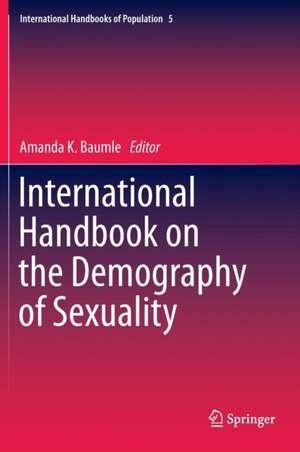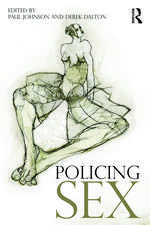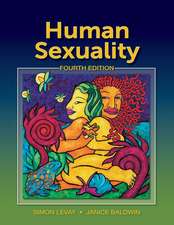International Handbook on the Demography of Sexuality: International Handbooks of Population, cartea 5
Editat de Amanda K. Baumleen Limba Engleză Hardback – 31 mai 2013
| Toate formatele și edițiile | Preț | Express |
|---|---|---|
| Paperback (1) | 1812.35 lei 38-45 zile | |
| SPRINGER NETHERLANDS – 23 aug 2016 | 1812.35 lei 38-45 zile | |
| Hardback (1) | 2107.18 lei 6-8 săpt. | |
| SPRINGER NETHERLANDS – 31 mai 2013 | 2107.18 lei 6-8 săpt. |
Preț: 2107.18 lei
Preț vechi: 2569.73 lei
-18% Nou
Puncte Express: 3161
Preț estimativ în valută:
403.20€ • 420.98$ • 333.71£
403.20€ • 420.98$ • 333.71£
Carte tipărită la comandă
Livrare economică 04-18 aprilie
Preluare comenzi: 021 569.72.76
Specificații
ISBN-13: 9789400755116
ISBN-10: 9400755112
Pagini: 436
Ilustrații: VI, 429 p. 46 illus.
Dimensiuni: 178 x 254 x 29 mm
Greutate: 0.97 kg
Ediția:2013
Editura: SPRINGER NETHERLANDS
Colecția Springer
Seria International Handbooks of Population
Locul publicării:Dordrecht, Netherlands
ISBN-10: 9400755112
Pagini: 436
Ilustrații: VI, 429 p. 46 illus.
Dimensiuni: 178 x 254 x 29 mm
Greutate: 0.97 kg
Ediția:2013
Editura: SPRINGER NETHERLANDS
Colecția Springer
Seria International Handbooks of Population
Locul publicării:Dordrecht, Netherlands
Public țintă
ResearchCuprins
I. Introduction to the Demography of Sexuality: 1: Introduction: The Demography of Sexuality (Amanda K. Baumle, University of Houston).- 2: Sexual Behavior and Practices: Data and Measurement (Stuart Michaels, University of Chicago).- 3: Best Pratices: Collecting and Analyzing Data on Sexual Minorities (Laura Durso and Gary Gates, The Williams Institute, UCLA School of Law).- II. Sexual Practices: The Global Picture: 4: Sexual Behavior, Sexual Identity, and Sexual Attraction in the United States: Data from the 2006-2010 National Survey of Family Growth (Anjani Chandra, Casey E. Copen, and William D. Mosher, National Center for Health Statistics).- 5: Sexual practices of Latin America and the Caribbean (Cecelia Gayet, FLACSO Mexico; Fatima Juarez, El Colegio de Mexico; and Michel Bozon, INED).- 6: Sexual Practices in Africa (Yanyi K. Djamba, Auburn University Montgomery).- 7: Sexuality in China (Nicole Farris, University of West Alabama; Lei He, Texas A&M University; Dudley L. Poston, Jr., Texas A&M University; Carol S. Walther, Northern Illinois University; Chris Russell, Texas A&M University; Heather Kincannon, Texas A&M University).- III. Sexual Practices Across the Life Course.- 8: Sex in Committed Relationships (Pepper Schwartz, Brian J. Serafini, and Ross Cantor, University of Washington).- 9: Adolescent Sexual Experiences (Jennifer Pearson, Wichita State University; Lindsey Wilkinson, Portland State University).- 10: Sexuality Among Older Adults (Osmo Kontula, Population Research Institute).- IV. Sexual Identities.- 11: The Prevalence of Gay Men and Lesbians (Christopher Scott Carpenter, UC Irvine).- 12 : Geography of the LGBT Population (Gary Gates, The Williams Institute, UCLA).- 13: The Demography of Sexuality and the Labor Market (Amanda K. Baumle, University of Houston).- 14: The Family and Gay Men and Lesbians (D’Lane R. Compton, University of New Orleans).- 15: The Demography of Asexuality (Anthony Bogaert, BrockUniversity).- 16: The Demographics of the Transgender Population (Stacey Lawrence Colton Meier, University of Houston; Christine M. Labuski, University of Arkansas): V. Applied Demography of Sexuality: Perspectives on Policy.- 17: Patterns of Relationship Recognition by Same-Sex Couples in the United States (M.V. Lee Badgett, University of Massachusetts-Amherst; Jody Herman, Williams Institute, UCLA).- 18: Sexuality in the Military (Karen De Angelis, Michelle Sandhoff, Kimberly Bonner, and David R. Segal, University of Maryland).- 19: Demographics of Gay and Lesbian Adoption and Family Policies (Mary Ann Davis, Sam Houston State University).- 20: Same-Sex Couples’ Construction of Census Categories (Carol S. Walther, Northern Illinois University).- VI: Conclusion.- 21: The Future of the Demography of Sexuality (Amanda K. Baumle, University of Houston).
Recenzii
From the reviews:
“This current volume, International Handbook on the Demography of Sexuality, comprising 21 chapters organized into five parts … . I recommend the volume highly to all in psychology and the behavioral sciences with an interest in human sexuality.” (John C. Gonsiorek, PsycCRITIQUES, Vol. 59 (15), April, 2014)
“This current volume, International Handbook on the Demography of Sexuality, comprising 21 chapters organized into five parts … . I recommend the volume highly to all in psychology and the behavioral sciences with an interest in human sexuality.” (John C. Gonsiorek, PsycCRITIQUES, Vol. 59 (15), April, 2014)
Notă biografică
Amanda K. Baumle is Associate Professor of Sociology at University of Houston. She received her J.D. from the University of Texas at Austin and her Ph.D. from Texas A&M University. Her research and teaching are focused in the areas of demography and the sociology of law, with a focus on issues involving gender and sexual orientation. She employs both quantitative and qualitative methodologies in her research.
Dr. Baumle has authored and edited books, articles, and book chapters examining issues of inequality and discrimination, as well as the manner in which the law might be activated as a means to challenge existing inequalities. Her current research explores issues involving the demography of sexual orientation and the legal consciousness of same-sex parents.
She is the author of Sex Discrimination and Law Firm Culture on the Internet: Lawyers at the 'Information Age Water Cooler' (2009), which examines attorneys' use of legal discourse in an Internet community as a vehicle for challenging gender discrimination. Dr. Baumle is also the coauthor of The Demography of Sexual Orientation (2009), which draws on 2000 U.S. Census data to examine the manner in which sexual orientation affects a variety of demographic processes. Dr. Baumle is currently working on an edited International Handbook of the Demography of Sexuality, which will include more than 30 chapters examining sexual behavior, identity, desires, and the manner in which traditional demographic outcomes are affected by these factors (forthcoming 2012).
Dr. Baumle has authored and edited books, articles, and book chapters examining issues of inequality and discrimination, as well as the manner in which the law might be activated as a means to challenge existing inequalities. Her current research explores issues involving the demography of sexual orientation and the legal consciousness of same-sex parents.
She is the author of Sex Discrimination and Law Firm Culture on the Internet: Lawyers at the 'Information Age Water Cooler' (2009), which examines attorneys' use of legal discourse in an Internet community as a vehicle for challenging gender discrimination. Dr. Baumle is also the coauthor of The Demography of Sexual Orientation (2009), which draws on 2000 U.S. Census data to examine the manner in which sexual orientation affects a variety of demographic processes. Dr. Baumle is currently working on an edited International Handbook of the Demography of Sexuality, which will include more than 30 chapters examining sexual behavior, identity, desires, and the manner in which traditional demographic outcomes are affected by these factors (forthcoming 2012).
Textul de pe ultima copertă
The International Handbook on the Demography of Sexuality is the first book to specifically address the study of sexuality from a demographic perspective. Demographic research has largely paid little attention to sexuality as a whole, or sexual orientation in particular, other than in studies examining the “consequences” of sex – sexually transmitted infections or fertility. Instead, the content of this handbook explores population sexuality in order to describe the prevalence of sexual behaviors, desires, and identities, as well as their connections with other demographic outcomes. The focus is on analyzing sexuality as a demographic topic in its own right, rather than solely as a variable in studies of sexually transmitted infection or other health-related topics. In this book, both researchers with traditional demographic backgrounds, as well as those with training in other disciplines, provide an overview of the state of current research on population sexuality. These chapters provide a foundation for the development of research in the burgeoning field of the demography of sexuality.
Caracteristici
The first book dedicated to the demography of sexuality Expands the field of demography to include sexuality Considers population sexuality from an international perspective Provides population analysis that has both academic and policy implications



























